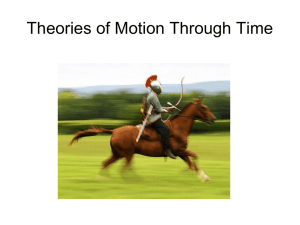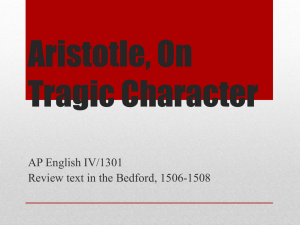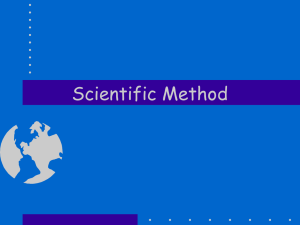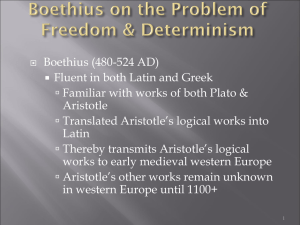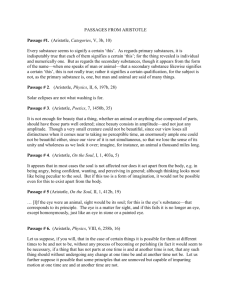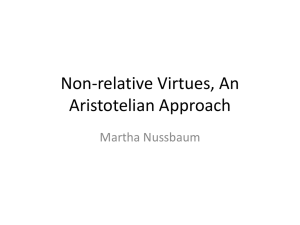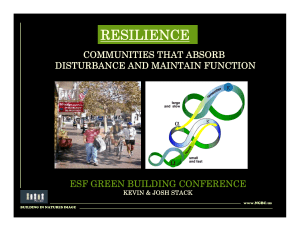Bob Hale/Contingent Beings/Sheffield Comments welcome, but
advertisement
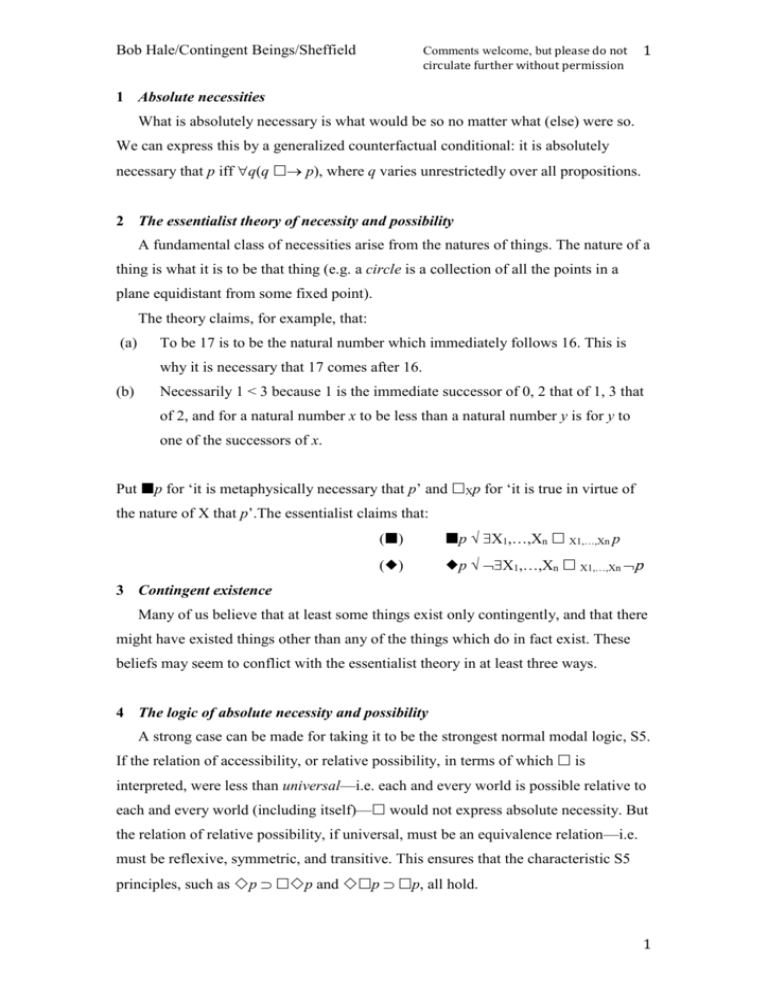
Comments welcome, but please do not circulate further without permission Bob Hale/Contingent Beings/Sheffield 1 1 Absolute necessities What is absolutely necessary is what would be so no matter what (else) were so. We can express this by a generalized counterfactual conditional: it is absolutely necessary that p iff q(q p), where q varies unrestrictedly over all propositions. 2 The essentialist theory of necessity and possibility A fundamental class of necessities arise from the natures of things. The nature of a thing is what it is to be that thing (e.g. a circle is a collection of all the points in a plane equidistant from some fixed point). The theory claims, for example, that: (a) To be 17 is to be the natural number which immediately follows 16. This is why it is necessary that 17 comes after 16. (b) Necessarily 1 < 3 because 1 is the immediate successor of 0, 2 that of 1, 3 that of 2, and for a natural number x to be less than a natural number y is for y to one of the successors of x. Put p for ‘it is metaphysically necessary that p’ and Xp for ‘it is true in virtue of the nature of X that p’.The essentialist claims that: () p X1,…,Xn X1,…,Xn p () p X1,…,Xn X1,…,Xn p 3 Contingent existence Many of us believe that at least some things exist only contingently, and that there might have existed things other than any of the things which do in fact exist. These beliefs may seem to conflict with the essentialist theory in at least three ways. 4 The logic of absolute necessity and possibility A strong case can be made for taking it to be the strongest normal modal logic, S5. If the relation of accessibility, or relative possibility, in terms of which is interpreted, were less than universal—i.e. each and every world is possible relative to each and every world (including itself)— would not express absolute necessity. But the relation of relative possibility, if universal, must be an equivalence relation—i.e. must be reflexive, symmetric, and transitive. This ensures that the characteristic S5 principles, such as p p and p p, all hold. 1 Bob Hale/Contingent Beings/Sheffield Comments welcome, but please do not circulate further without permission 2 5 Absolute necessity and quantification If (Brouwersche) p p is adjoined to a standard quantified version of the weakest normal modal logic K, one can prove: x(x) x(x) (Barcan) and: (Converse Barcan) x(x) x(x) A fortiori, both principles are theorems of standard quantified S5. (CB) requires that every object necessarily exists; (B) requires that the only objects which could exist do exist. The cleanest way to avoid these consequences is to replace standard quantification theory by a negative free version, restricting the Universal Instantiation rule by requiring a supplementary premise asserting the existence of a referent for the instantial term—e.g. (Free -Elimination) From x A(x), together with an atomic premise F(t), we may infer A(t), where t can be any term. The conclusion depends upon the same assumptions as the premises 5 Individual natures and necessity A troublesome argument: It is true in virtue of his nature that Aristotle is a man. What is true in virtue of a thing’s nature is necessary. So Aristotle is necessarily a man. But nothing can be true of Aristotle unless he exists. So Aristotle necessarily exists! More formally: 1 (1) Aristotle Aristotle is a man assumption 2 (2) pX(Xp p) assumption 1,2 (3) Aristotle is a man from (1) and (2) 4 (4) x(x x exists) assumption 4 (5) (Aristotle is a man Aristotle exists) from (4) Aristotle exists from (3) and (5) 1,2,4 (6) 2 Bob Hale/Contingent Beings/Sheffield 6-8 Comments welcome, but please do not circulate further without permission 3 Ways out The essentialist can’t reject (2). It is simply built into the idea that a property is essential to being something of a certain kind that nothing could be of that kind without having that property. (4) might be denied for various reasons, but none seems to yield a satisfactory way out. The most promising is Kit Fine’s. This invokes a distinction between ‘worldly’ and ‘unworldly’ or ‘transcendental’ necessities—true whatever the world is like vs true regardless of how the world is. But this is insufficiently clear. Two other ways out: (i) Reject step from (4) to (5)—it fails in negative free logic. (ii) Statements of individual essence should be properly conditionalized, avoiding commitment to existence. So (1) should be replaced by: (1) Aristotle x(x = Aristotle x is a man) When this is done, the argument is no longer valid. 9 The argument from contingent natures (i) If some of the things which actually exist might not have done so, something which must be true, given the natures of the things that actually exist, might have failed to be true, had some of those things not existed—so that it is only necessary relative to certain assumptions about what exists, not necessary absolutely. (ii) If there might have been things in addition to those which actually exist, then even if a certain proposition’s truth is not ruled out by the natures of any existing things, it might well have been ruled out, had there been some extra things (and so some additional natures) to constrain what is possible—so that that proposition’s truth is only possible in a relative sense, not absolutely. So () and () fail, and must be replaced by modalized versions: () p X1,…,Xn X1,…,Xn p () p X1,…,Xn X1,…,Xn p But these obviously cannot serve to explain metaphysical necessity and possibility. 3 Bob Hale/Contingent Beings/Sheffield 10 Comments welcome, but please do not circulate further without permission 4 Which natures are contingent? Although some things which exist might have failed to exist, and there might have been some things other than the things which actually exist, the scope for contingent existence and non-existence is limited. (a) Purely general properties (including relations) necessarily exist. A purely general property is one expressed by a purely general predicate—i.e. one devoid of singular reference to individual objects. (b) A necessary and sufficient condition for the existence of a purely general property is that there could be a predicate expressing . Put p for ‘ exists’, q for ‘there exists a predicate expressing ’. Then: (p q). It follows in S5 that (p p). (c) The scope for contingent existence and non-existence is limited to objects and object-dependent properties. Many existing objects, and so many existing objectdependent properties, might not have existed. And there might have existed objects, and so object-dependent properties, other than those which actually exist. (d) Consequently, any possible variation in what natures there are depends upon possible variation in what objects there are. 11 More (‘new’) objects and natures The existence of new objects, and so of new individual natures, would impose no further restriction on the range of metaphysical possibilities—for the possibilities for new objects are purely general, so that anything the new natures might rule out must be already ruled out by existing purely general natures. 12 Fewer (‘old’) objects and natures The non-existence of the nature of some actually existing object, e.g. Aristotle, would not open up new general possibilities not involving Aristotle, for these are determined by purely general natures, all of which necessarily exist. And it would not give rise to new possibilities for any particular objects—not for Aristotle, because in the event of his non-existence, there would be no propositions about him at all; and not for any other particular object, since Aristotle’s nature imposes no restriction on them in any case. 4


